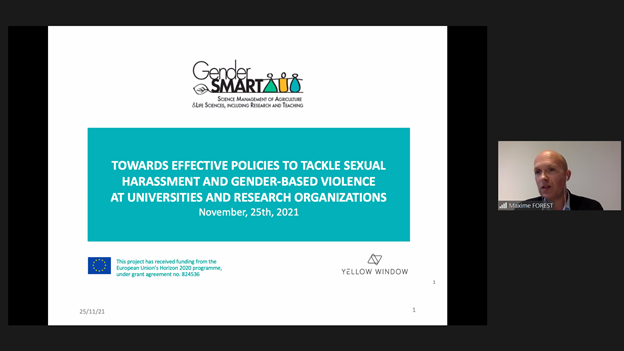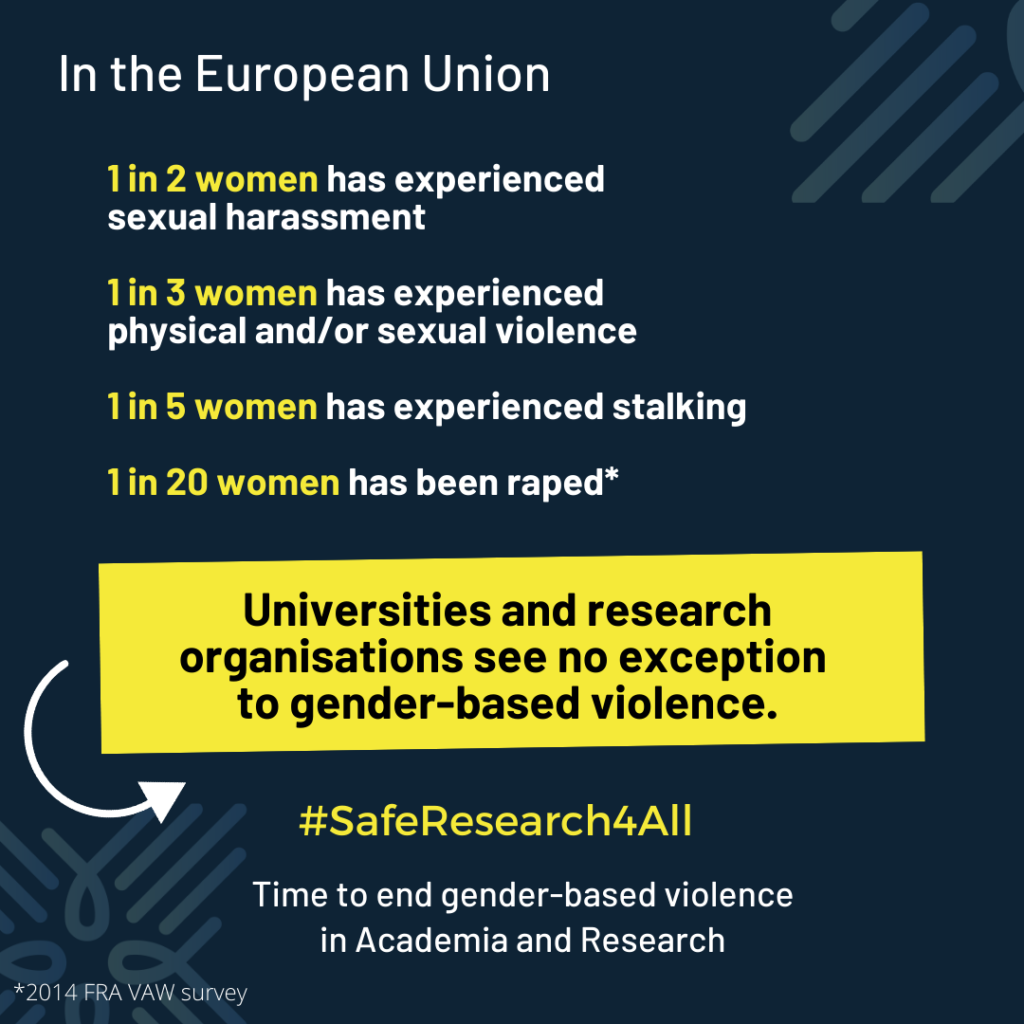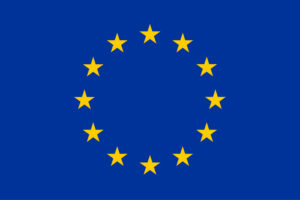As November 25 is the International Day for the Elimination of Violence against Women, Gender-SMART project could not miss the opportunity to promote policies and outlining solutions to support its partners in tackling sexual harassment and gender-based violence as one of the recommended areas of action for gender equality plans to be adopted under Horizon Europe.
For this reason, Gender-SMART celebrated the day with a capacity building session for its partners and the support of the Twitter campaign #SafeResearch4All started from its sister project; UniSAFE.
Capacity building session organised by Yellow Window and offered by Dr. Maxime Forest

An Online capacity-building session on Gender-based Violence and Sexual Harassment Policies was organised by Yellow Window and offered to the Gender-SMART consortium to support in their policies and practices. The session was entitled as “Towards effective policies to tackle sexual harassment and gender-based violence at universities and research organizations: a few hints from practice” and interesting discussions took place, practices and useful resources were shared. The learning objectives of the session were the following;
- Introducing definitions and key facts on sexual harassment and gender-based violence in research and the academia
- Critically analyzing the institutional response in terms of policies, highlighting main limits and flaws
- Enhancing capacities for tackling sexual harassment and gender-based violence based on evidence and best practices
Some partners also shared links to their public policies, which you can find below for inspiration:
- The Cyprus University of Technology (CUT) approved in March 2021 its Sexual Harassment policy (In Greek) LINK
- Wageningen University & Research (WUR) has on its website a code of conduct, complaint procedure for ‘undesired behaviour’ and then the protocol for confidential officers that you can find here. These forms of harassment are also monitored in our two-yearly held Employee Monitor. Major information and further advice for students can also be found here.
A few further readings were also recommended:
- Bai, Y., Lu, L. & Lin-Schilstra, L. Auxiliaries to Abusive Supervisors: The Spillover Effects of Peer Mistreatment on Employee Performance. J Bus Ethics (2021).
- The power of changing from a bystander to a (pro-active) ally, very useful to fight unjust behaviour in everyday situations by Gabe Javier
#SafeResearch4All Twitter campaign organised with sister projects
At the same time, Gender-SMART supported the campaign organised jointly with sister projects on Twitter on gender-based violence in research and academia. The campaign will be running between 22 and 29 November, so there is still time to join.
Gender-based violence is a complex, prevalent, persistent feature and force in many organisations, with pandemic proportions. Violence, violations, and abuse may be physical, sexual, economic/financial, psychological – online or offline – and can include gender or sexual harassment.
Universities and research organisations are not exempt from this pandemic. Specific organisational structures can even create conditions for hierarchies of power that are structured by gender and age and regularly underpin violence. While gender-based violence deeply impacts individual lives, it also has serious social, economic, and health repercussions on organisational and social levels.
Despite the scale, the political significance and the growing interest in academia, gender-based violence in research organisations remains largely under-reported and under-researched. It also often remains unspoken.
UniSAFE project
You can still participate – How to?
From 22 to 29 November, all projects, organisations, and individuals intend on eradicating gender-based violence in academia and research organisations are invited to actively post on social media using the hashtag #SafeResearch4All. Media, articles, reports designed or collected by UniSAFE and sister projects – namely the SUPERA project – have been made freely available in an Awareness-raising Toolkit. When sharing UniSAFE results, full acknowledgement of the project and authors must be mentioned, as stated in the introduction to the reports.



